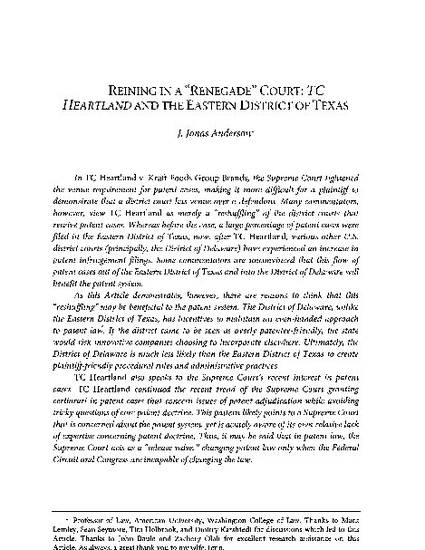
Cardozo Law Review
In TC Heartland v. Kraft Foods Group Brands, the Supreme Court tightened the venue requirement for patent cases, making it more difficult for a plaintiff to demonstrate that a district court has venue over a defendant. Many commentators, however, view TC Heartland as merely a “reshuffling” of the district courts that receive patent cases. Whereas before the case, a large percentage of patent cases were filed in the Eastern District of Texas, now, after TC Heartland, various other U.S. district courts (principally, the District of Delaware) have experienced an increase in patent infringement filings. Some commentators are unconvinced that this flow of patent cases out of the Eastern District of Texas and into the District of Delaware will benefit the patent system.
As this Article demonstrates, however, there are reasons to think that this “reshuffling” may be beneficial to the patent system. The District of Delaware, unlike the Eastern District of Texas, has incentives to maintain an even-handed approach to patent law. If the district came to be seen as overly patentee-friendly, the state would risk innovative companies choosing to incorporate elsewhere. Ultimately, the District of Delaware is much less likely than the Eastern District of Texas to create plaintiff-friendly procedural rules and administrative practices.
TC Heartland also speaks to the Supreme Court’s recent interest in patent cases. TC Heartland continued the recent trend of the Supreme Court granting certiorari in patent cases that concern issues of patent adjudication while avoiding tricky questions of core patent doctrine. This pattern likely points to a Supreme Court that is concerned about the patent system, yet is acutely aware of its own relative lack of expertise concerning patent doctrine. Thus, it may be said that in patent law, the Supreme Court acts as a “release valve,” changing patent law only when the Federal Circuit and Congress are incapable of changing the law.
Available at: http://works.bepress.com/jonas_anderson/32/
